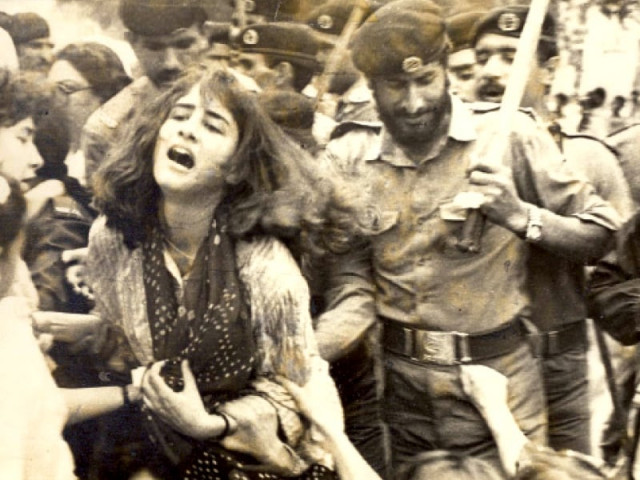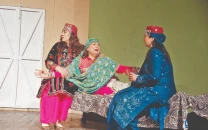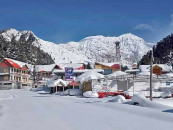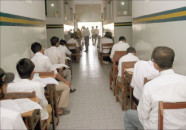National Women’s Day: Memoirs of trailblazing activists
Women across the country still suffer at the hands of weak and inadequate legal systems.

The picture shows Zhila Shah being baton charged by the police. PHOTO: RAHAT DAR/SHIRKATGAH
On this day, some three decades ago, 200 women activists took a stand for all the women of Pakistan. The year was 1983. Images of these women being beaten up by the police are now part of the country’s searing conscience.
These women defied the military dictatorship of the day by taking out a public demonstration in Lahore, despite martial law regulations that outlawed political activities, processions and public protests. These iconic women of the Women’s Action Forum (WAF) in collaboration with Pakistan Women Lawyers’ Association (PWLA) carried out a rally from Hall Road Lahore to the Lahore High Court to file a petition against the law of evidence which would reduce the testimony of women to half that of men. The accumulative trigger was the dictatorship’s unrelenting push to rescind women’s rights.
History has it that when these women reached the high court, the revolutionary poet Habib Jalib came to show solidarity with these women for their struggle for an egalitarian, democratic and progressive society and world order. He was beaten up by the police along with the women who were put behind bars for several hours.
Khawar Mumtaz, chairperson of the National Commission on the Status of Women (NCSW) and founding member of WAF, has vivid memories of that day. She recalls how shopkeepers kept an eye on the women and lent them support by taking them into their stores and providing them glasses of water.
Another founding member of WAF, Nighat Saeed Khan, says, “At that time we had a very suppressive military government; nobody came out against discriminative laws. Women were the first to challenge them.” Khan added that in 1982 WAF took a position against the proposed law of evidence.
Although as a result of the public demonstration on February 12, 1983 the proposed law of evidence was watered down, the eyewitness requirement remains an issue.
The enthusiasm of these women was infectious. Eyewitness Farida Shaheed shared her memory of the day. “There was a young activist named Shahnaz who was crying. I went to her to tell her not to cry because we all were facing the baton charge together. She replied that she was not crying because of the Lathi charge, but because she had managed to get the stick with which they were beating her but she didn’t get to beat them in return.”
“This demonstration became the symbol of women’s resistance to all forms of oppression and of their unshakeable belief in an equal, equitable and just democratic order guaranteeing human rights for all, especially those who have been historically marginalised,” said human rights activist Lala Rukh.
Since 1981, Women’s Action Forum has consistently fought to protect and promote women’s rights and human rights for all. Events have confirmed that WAF’s concerns articulated over the last three decades have had precisely those consequences that WAF feared, she says.
Won some battles, lost others
“12 February is that point in history when Pakistani women realised that they have to struggle for their rights,” said Farkhanda Aurangzeb, an activist from Balochistan. In Aurangzeb’s opinion, it has been 30 years and women are still very much marginalised, and work is needed to change the mindset of society.
Amna Durrani, coordinator officer, Provincial Commission on Status of Women (PCSW) Khyber Pakhtunkhwa (K-P), said, “It’s been 30 years but even today women in K-P suffer because of certain traditional practices made worse by weak and inadequate legal and administrative systems.” Shedding light on the happenings of the last decade in K-P, she said, “Natural and manmade emergencies have been a setback to advancement of the status of women in K-P.”
Madeeha Gauhar, an activist, who actually suffered the brutality on February 12, said on a disgruntled note that “nothing has changed in these 30 years”. “Only cosmetic improvements have been made. Discriminatory legislations still need to be changed,” she said.
The struggle must go on
“We must keep struggling for equal rights for all, democracy, secularism and human rights. In spite of even harsher challenges and threats to our lives, we have not given up,” said eyewitness Humaira Sheikh. She added: “We must learn to strategise, but never compromise. We must make sure that our voices are heard. We must stand with each other and speak out against any injustice.”
Amar Sindhu, activist and member of the Sindh Human Rights Commission, said, “They were challenging the dictatorial regime and its laws; it was easier to challenge it in a court of law, but in the current scenario we have to change the mindset of the people who are becoming intolerant and discriminatory towards women.”
Published in The Express Tribune, February 12th, 2014.
Correction: In an earlier version of this article it was stated that the woman in the photograph is Rahat Dar instead of Zhila Shah. The error is regretted.



















COMMENTS
Comments are moderated and generally will be posted if they are on-topic and not abusive.
For more information, please see our Comments FAQ